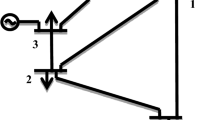Abstract
As the penetration of renewable generation in electricity networks increases, so does the challenge of maintaining the reliability of those networks. This work utilizes a scenario-based approach to solving a stochastic AC optimal power flow (OPF) problem. In addition to producing an optimal operating point, this method offers a-posteriori theoretical guarantees on the probability of violation for any arbitrary wind scenario that may be encountered in real-time operation. This work expands upon prior formulations by proposing six methods of initializing the stochastic AC-QP OPF algorithm. Results are presented for both the IEEE 14-bus and 3012wp networks; each network was augmented with two wind nodes. The performance of all initialization methods is assessed with regard to the total number of support scenarios, total execution time, and cost of operation. Each is shown to outperform a random initialization process. Trade-offs among these methods with respect to computational complexity and efficacy are also discussed.











Similar content being viewed by others
References
Wood, A.J., Wollenberg, B.F., Sheble, G.B.: Power Gener. Oper. Control, 3rd edn. John Wiley and Sons Inc, New Jersey (2013)
Motto, A., Galiana, F., Conejo, A., Arroyo, J.: Network-constrained multiperiod auction for a pool-based electricity market. IEEE Trans. Power Sys. 17(3), 646–653 (2002). https://doi.org/10.1109/TPWRS.2002.800909
Overbye, T., Cheng, X., Sun, Y.: A comparison of the AC and DC power flow model for LMP calculations. In: 37th Hawaii international conference on system sciences (HICSS) (2006). https://doi.org/10.1109/HICSS.2004.1265164
Stott, B., Jardim, J., Alsac, O.: DC power flow revisited. IEEE Trans. Power Sys. 24(3), 1290–1300 (2009). https://doi.org/10.1109/TPWRS.2009.2021235
Molzahn, D.K., Holzer, J.T., Lesieutre, B.C., DeMarco, C.L.: Implementation of a large-scale optimal power flow solver based on semidefinite programming. IEEE Trans. Power Syst. 28(4), 3987–3998 (2013). https://doi.org/10.1109/TPWRS.2013.2258044
Low, S.H.: Convex relaxation of optimal power flow: parts I & II. IEEE Trans. Control Netw. Syst. 1(1), 15–27 (2014). https://doi.org/10.1109/TCNS.2014.2309732
Bienstock, D., Munoz, G.: On linear relaxations of OPF problems (2015). http://arxiv.org/abs/1411.1120
Coffrin, C., Hijazi, H.L., Van Hentenryck, P.: The QC relaxation: theoretical and computational results on optimal power flow. IEEE Trans. Power Syst. 31(4), 3008–3018 (2016). https://doi.org/10.1109/TPWRS.2015.2463111
Gan, L., Low, S.H.: Convex relaxations and linear approximation for optimal power flow in multiphase radial networks. In: 18th power system computation conference (PSCC) (2014). https://doi.org/10.1109/PSCC.2014.7038399
Lesieutre, B.C., Molzahn, D.K., Borden, A.R., DeMarco, C.L.: Examining the limits of the application of semidefinite programming to power flow problems. In: 49th annual Allerton conference on communication control and computing, pp. 1492–1499 (2011). https://doi.org/10.1109/Allerton.2011.6120344
Molzahn, D., Lesieutre, B., DeMarco, C.: Investigation of non-zero duality gap solutions to a semidefinite relaxation of the optimal power flow problem. In: 47th Hawaii international conference on system sciences (HICSS) (2014). https://doi.org/10.1109/HICSS.2014.293
Marley, J.F., Molzahn, D.K., Hiskens, I.A.: Solving multiperiod OPF problems using an AC-QP algorithm initialized with an SOCP relaxation. IEEE Trans. Power Sys. 32(5), 3538–3548 (2017). https://doi.org/10.1109/TPWRS.2016.2636132
Bienstock, D., Chertkov, M., Harnett, S.: Chance-constrained optimal power flow: risk-aware network control under uncertainty. SIAM Rev. 56(3), 461–495 (2014). https://doi.org/10.1137/130910312
Roald, L., Oldewurtel, F., Krause, T., Andersson, G.: Analytical reformulation of security constrained optimal power flow with probabilistic constraints. In: IEEE PowerTech Conference (2013). https://doi.org/10.1109/PTC.2013.6652224
Bertsimas, D., Litvinov, E., Sun, X., Zhao, J., Zheng, T.: Adaptive robust optimization for the security constrained unit commitment problem. IEEE Trans. Power Sys. 28(1), 52–63 (2013). https://doi.org/10.1109/TPWRS.2012.2205021
Vrakopoulou, M., Katsampani, M., Margellos, K., Lygeros, J., Andersson, G.: Probabilistic security-constrained AC optimal power flow. In: IEEE PowerTech Conference (2013). https://doi.org/10.1109/PTC.2013.6652374
Papavasiliou, A., Oren, S., O’Neill, R.: Reserve requirements for wind power integration: a scenario-based stochastic programming framework. IEEE Trans. Power Sys. 26(4), 2197–2206 (2011). https://doi.org/10.1109/TPWRS.2011.2121095
Morales, J.M., Conejo, A., Perez-Ruiz, J.: Economic valuation of reserves in power systems with high penetration of wind power. IEEE Trans. Power Sys. 24(2), 900–910 (2009). https://doi.org/10.1109/TPWRS.2009.2016598
Vrakopoulou, M., Margellos, K., Lygeros, J., Andersson, G.: Probabilistic guarantees for the N-1 security of systems with wind power generation. In: Probabilistic methods applied to power systems conference (2012)
Marley, J.F., Vrakopoulou, M., Hiskens, I.A.: An AC-QP optimal power flow algorithm considering wind forecast uncertainty. In: IEEE innovative smart grid technologies - Asia, pp. 317–323 (2016). https://doi.org/10.1109/ISGT-Asia.2016.7796405
Campi, M.C., Garatti, S., Ramponi, F.A.: Non-convex scenario optimization with application to system identification. In: 54th IEEE conference on decision and control (2015). https://doi.org/10.1109/CDC.2015.7402845
Calafore, G., Campi, M.C.: The scenario approach to robust control design. IEEE Trans. Autom. Control 51(5), 742–753 (2006). https://doi.org/10.1109/TAC.2006.875041
Alamo, T., Tempo, R., Luque, A.: On the sample complexity of randomized approaches to the analysis and design under uncertainty. In: Proceedings of the American control conference (2010). https://doi.org/10.1109/ACC.2010.5531078
Yang, Y., Sutanto, C.: Chance-constrained optimization for nonconvex programs using scenario-based methods. ISA Trans. 90, 157–168 (2019). https://doi.org/10.1016/j.isatra.2019.01.013
Rocchetta, R., Crespo, L., Kenny, S.: A scenario optimization approach to reliability-based design. Reliab. Eng. Sys. Saf. 196, 106755 (2020). https://doi.org/10.1016/j.ress.2019.106755
Hastie, T., Tibshirani, R., Friedman, J.: The elements of statistical learning: data mining, inference, and prediction, 2nd edn. Springer, New York (2009)
Zimmerman, R.D., Murillo-Sánchez, C.E., Thomas, R.J.: MATPOWER: steady-state operations, planning, and analysis tools for power systems research and education. IEEE Trans. Power Syst. 99, 1–8 (2011). https://doi.org/10.1109/TPWRS.2010.2051168
Coffrin, C.: STAC: Steady-state AC network visualization in the browser. Available at https://immersive.erc.monash.edu/stac/ (2017)
Author information
Authors and Affiliations
Corresponding author
Ethics declarations
Conflict of interest
The authors declare that they have no conflict of interest.
Additional information
Publisher's Note
Springer Nature remains neutral with regard to jurisdictional claims in published maps and institutional affiliations.
Rights and permissions
About this article
Cite this article
Piccoli, D., Marley, J. Improving the initialization of a stochastic AC-QP optimal power flow algorithm. Int J Energy Environ Eng 14, 109–120 (2023). https://doi.org/10.1007/s40095-022-00509-1
Received:
Accepted:
Published:
Issue Date:
DOI: https://doi.org/10.1007/s40095-022-00509-1




